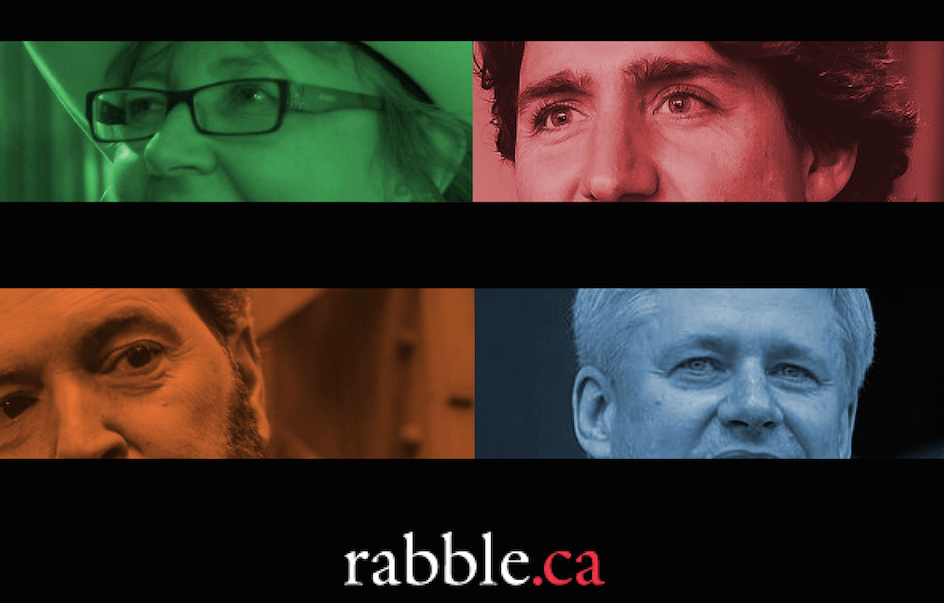Chip in to keep stories like these coming.
Three of the four participants in the August 6 leaders’ debate agreed that environmental protection can also bring economic benefits — “win-win” outcomes. Thomas Mulcair, stressing his record of passing sustainable development legislation as Quebec’s environment minister, said: “Respect for the environment and a strong economy are not opposites; they go hand in hand.” Justin Trudeau said: “You cannot make a choice between what’s good for the environment and what’s good for the economy.” Elizabeth May said: “Canada needs to take action so that we can defend ourselves from the changing global climate and from the impacts economically here at home.”
Only Stephen Harper failed to acknowledge any positive aspects of environmental protection. At the beginning of the environment segment of the debate, he made it clear that his aim is to increase exports of Canadian energy resources. He said: “our energy exports have increased… until recently, obviously — not just our oil and gas exports to the United States, but we’ve also seen increasing uranium exports and coal exports and others to Asia.” Harper’s priority on energy exports rather than environmental protection is no surprise. After his Conservatives won a majority government in the 2011 election, they dismantled years of carefully crafted environmental protection legislation, burying the changes in omnibus budget bills.
The only environment issue addressed in detail during the debate was oil pipelines. Mulcair criticized Harper’s “gutting” of environmental laws, saying he would review proposals with a thorough and credible environmental assessment process. May stressed that the Green Party opposes all pipeline proposals that involve export of raw tar sands bitumen. Trudeau said that Harper “hasn’t convinced communities of the rightness of his — his pipelines,” while leaving his own position unclear.
Debate moderator Paul Wells pressed Trudeau, saying “it sometimes sounds like you say if we put the right price on carbon… we could have pipelines going hither and yon.” But even when pressed, Trudeau did not comment on individual proposals or clarify his party’s general position on pipelines.
Mulcair provided some detail on the complexity of issues associated with individual pipeline projects. He explained that the Energy East pipeline might provide a positive outcome if a thorough assessment were done of Canadian jobs and energy security, royalties in the producing province, and transport risks involved with rail and tanker traffic. However, the NDP rejects the proposed Northern Gateway pipeline because it deems supertanker traffic in the Douglas Channel at the pipeline’s terminus to be unacceptable.
May repeatedly pressed Mulcair to also reject the Kinder Morgan pipeline proposal, noting that it would increase tanker traffic in the port of Vancouver. In reply, Mulcair criticized May for taking the position on pipelines “that you can say no to them — all of them — in advance.”
While the debate shed some light on pipeline issues, this represents a remarkably narrow slice of the environmental issues that the next federal government will face.
The Harper government has done great damage to Canada’s international reputation by muzzling scientists, withdrawing from the Kyoto Protocol, withdrawing from the treaty on desertification (even as a major drought is affecting Western Canada), failing to ratify the Biosafety Protocol dealing with genetically modified organisms, and opting out of all its obligations at the 2013 meeting of the Convention on International Trade in Endangered Species.
It’s early in the campaign and the parties have not yet released detailed platforms. One hopes that the leaders will address a broader range of environmental issues in the coming weeks, including: combating climate change, pollution and biodiversity loss; strengthening domestic environmental legislation; restoring Canada’s international environmental reputation; and unmuzzling federal scientists.
Ole Hendrickson is a retired forest ecologist and a founding member of the Ottawa River Institute, a non-profit charitable organization based in the Ottawa Valley.
Chip in to keep stories like these coming.




